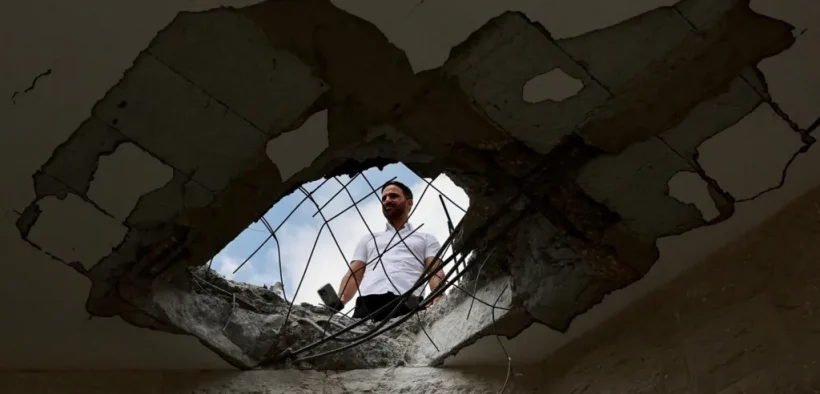UN urges calm after Israel and Hezbollah trade strikes

UN Secretary General António Guterres has said he is “deeply concerned” after Israel and Lebanon’s Hezbollah movement mounted their biggest round of cross-border strikes since the war in Gaza began.
On Sunday, Israeli jets hit dozens of sites across southern Lebanon in what it said were pre-emptive strikes to prevent a much wider attack, and Hezbollah launched hundreds of rockets and drones at Israel.
Mr Guterres warned that their actions put civilians at risk, as well as threatening regional security and stability.
The US said it was working to avoid a further escalation in hostilities, and both sides suggested they were not interested in one.
There have been almost daily exchanges of fire across the Israel-Lebanon border since the day after the start of the war between Israel and Hamas in Gaza on 7 October.
Hezbollah has said it is acting in support of the Palestinian group. Both are backed by Iran and proscribed as terrorist organisations by Israel, the UK and other countries.
Since October, more than 560 people have been reported killed by Lebanon’s health ministry, the vast majority of them Hezbollah fighters, while 26 civilians and 24 soldiers have been killed in Israel, according to authorities.
Almost 200,000 people have also been displaced on both sides of the border.
The Israeli attack on Hezbollah began before dawn Sunday, when the military said about 100 jets bombed thousands rocket launchers at more than 40 sites in southern Lebanon.
The strikes were launched after “extensive preparation” for a large-scale aerial attack by Hezbollah were detected, according to the military.
Hezbollah said two of its fighters were killed in the strikes along with another fighter from the allied Amal movement.
Hezbollah said it had targeted and hit 11 military facilities in Israel and the occupied Golan Heights with 340 rockets and a “large number” of drones.
It described the barrage as a response to the assassination of senior military commander Fuad Shukr, who was killed in an Israeli strike in Beirut on 30 July.
The Israeli military said it intercepted “many of the threats” launched by Hezbollah and that the projectiles which landed did “very little damage”.
However, it also said a navy soldier was killed in combat in northern Israel, with local media reporting that he had been on a patrol boat when an interceptor missile engaged a drone.
On Sunday evening, Hezbollah leader Hassan Nasrallah gave a televised speech to his supporters that appeared to seek to draw a line under the escalation.
He declared the group’s “first response” for the retaliation for Shukr’s assassination had been completed “as planned”, although he noted that its impact was still being assessed.
“If the result is not sufficient, we will reserve the right to respond at another time,” he said.
In the meantime, he added, the people of Lebanon “can be at ease and carry on with their lives, as the country has been in tension for a month now”.
BBC










